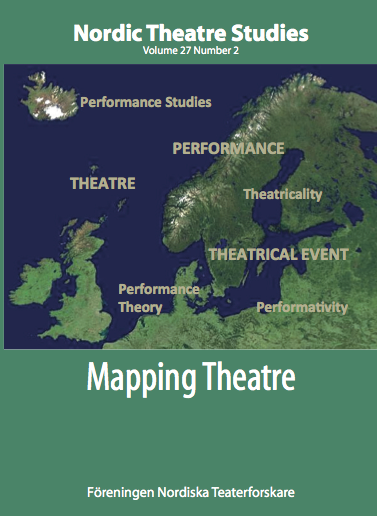Activating Imaginative Attention and Creating Observant Moments in the Everyday Through the Art of Walking
DOI:
https://doi.org/10.7146/nts.v27i2.24251Keywords:
walking, physical theatre, imaginative attention, everyday poetry, listening, performative writing, artistic researchAbstract
Since 2013, I have been conducting a collaborative project on walking together with the actress and tightrope walker Helena Kågemark, where walking has become a means for inquiry-based performing. The purpose of this project was to apply techniques and strategies from the theatre work we pursue in situations outside of the theatre on walking actions in urban spaces – in order to create attention as well as bring forth poetry in situations of everyday life. The project included a wide range of activities and events; from our own explorative walks documented through “walking journals” to participatory walks with others and public presentations of performance acts, performance lectures, discussions, workshops and exhibitions. In our project, we used physical acting techniques to create attention and meaning in situations that emerged in the streets. Our aim was to go beyond the automatic patterns of the everyday when walking through town in order to activate a way to relate to the environment and to create experience that develops both the perception and imagination of the one who walks. We chose to focus on the seemingly small and invisible stories and observations of the everyday, while actively carrying out a psychophysical walk. In this article, I would like to reflect on certain parts of the walking project in order to investigate more closely how we transferred our experience as theatre practitioners to walking activities, and in doing so, activating imaginative attention in order to create observant moments in everyday situations.References
Elizabeth Adams St.Pierre, “Circling the Text. Nomadic Writing Practices” in Qualitative Inquiry, Vol. 3, No. 4, 1997.
Kurt Aspelin, Bengt A. Lundberg, eds., Form och struktur. Texter till en metodologisk tradition inom litteraturvetenskapen, Norstedt, Stockholm 1971.
Les Back, The Art of Listening, Berg, Oxford, New York 2007.
Rosi Braidotti, Nomadic Theory. The Portable Rosi Braidotti, Columbia University Press, New York 2011.
Bertolt Brecht, Brecht on Theatre: The Development of an Aesthetic, John Willett, ed. and transl., Methuen, London 1964.
Judith Butler, Bodies That Matter: On the Discursive Limits of “sex”, Routledge, New York 1993.
Emma Cocker, “Choreographing Collectivity through Invitation and Response” in Rhizomes, Issue 21, Winter 2010.
Clifford Geertz, The Interpretation of Cultures: Selected Essays, Basic Books, New York, 1973.
Michael de Certeau, The Practice of Everyday Life, transl. Steven Rendall, University of California Press, Berkeley 2011.
Guy Debord, ”Introduction to a Critique of Urban Geography” in Situationists International Online.
Susan Haedicke, “Beyond Site-Specificity: Environmental Heterocosms on the Street” in Performing Site-Specific Theatre, Sophie Nield, Anna Birch, Joanne Tompkins, eds., Palgrave Macmillan, Houndsmills 2012.
Tim Ingold, “Bringing Things to Life: Creative Entanglements in a World of Materials”, Working paper #15, University of Aberdeen, July 2010.
Frederic Jameson, Brecht and Method, Verso, London, New York 1998.
Helena Kågemark, Walking Journal, 7 May 2013, Vezzano Alto, Italy.
Cecilia Lagerström, Helena Kågemark, “In One Step” in ways to wander, Clare Qualmann, Claire Hind, eds., Triarchy Press, Axminster 2015.
Cecilia Lagerström, Forms for Life and Theatre: Institutet för Scenkonst and Tacit Knowing, Gidlunds, Hedemora 2003.
Cecilia Lagerström, Walking Journal, 29 September 2013, the woods around the Botanical Gardens in Gothenburg, Sweden.
Carl Lavery, “Mourning Walk and Pedestrian Performance: History, Aesthetics and Ethics” in Walking, Writing & Performance, Roberta Mock, ed., Intellect Books, Bristol 2009.
Ingemar Lindh, Stepping Stones, Routledge, Oxford, New York 2013.
Tom McDonough, ed., Guy Debord and the Situationist International, Texts and Documents, MIT Press, Cambridge 2002.
Jean-Luc Nancy, Listening, transl. Charlotte Mandell, Fordham University Press, New York 2007.
Sophie Nield, Anna Birch, Joanne Tompkins, eds. “Siting the People: Power, Protest, and Public Space” in Performing Site-Specific Theatre. Politics, Place, Practice, Palgrave Macmillan, Houndsmills 2012.
Mike Pearson, Michael Shanks, Theatre/ Archaeology, Routledge, London, New York 2001.
Andrea Phillips, “Cultural geographies in practice: Walking and looking” in Cultural Geographies, Vol. 12, October 2005.
Michael Polanyi, The Tacit Dimension, University of Chicago Press, Chicago 1966.
Donald Schön, The Reflective Practitioner. How Professionals Think In Action, Arena, Aldershot 1995.
Stefan Sjöberg, “Gatan är stadens viktigaste plats” in Arkitektur, No. 4, 2015.
Barbro Smeds, “Skakande situationer – en resa i identitet och igenkänning”, in Berättelse och kunskap. Slutrapport nr 2 från Kollegiet för forskning och utvecklingsarbete på det konstnärliga området, Dramatiska Institutet, Stockholm 2006.
Keri Smith, How to Be an Explorer of the World. Portable Art Life? Museum, Penguin Books, London 2008.
Rebecca Solnit, Wanderlust: A History of Walking, Verso, London 2002.
Christel Stalpaert, Karolien Byttebier, “Art and Ecology, Scenes from a Tumultuous Affair” in The Ethics of Art: Ecological Turns in the Performing Arts, Guy Cools, Pascal Gielen, eds., Antennae, Valiz, Amsterdam 2014.
Fiona Wilkie, “Kinds of Place at Bore Place: Site-Specific Performance and the Rules of Spatial Behaviour” in New Theatre Quarterly, Vol. 18, Issue 03, 2002.
Phillip B. Zarrilli, Psychophysical Acting: An Intercultural Approach after Stanislavski, Routledge, London, New York 2009.
Downloads
Published
How to Cite
Issue
Section
License
The copyright belongs to the authors and Nordic Theatre Studies. Users can use, reuse and build upon the material published in the journal but only for non-commercial purposes. Users are allowed to link to the files, download the files, distribute the files on a local network (preferably by links), upload the files to local repositories if their institutions require them to do so, but not republish the files without proper agreements with the journal and the author.

